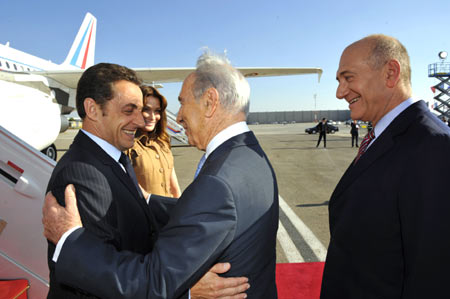Is French President Nicolas Sarkozy able to trigger a revolutionary change in local geopolitics or will he join the line of dignitaries who failed to leave an imprint on Israeli-Arab relations?
Freddy Eytan, who heads the Israel-Europe project at the Jerusalem Center for Public Affairs, sees Sarkozy's initiative to create a Mediterranean Union in hopes of fortifying ties with North-African states, several of which are opposed to Israel's involvement in the union, as a great initiative for economic cooperation which can serve as a basis for political stability.

France's President Nicolas Sarkozy and his wife Carla Bruni-Sarkozy are welcomed by Israel's President Shimon Peres (2nd R) as they arrive at Tel Aviv airport June 22, 2008. (Xinhua/Reuters Photo)
"France's involvement can help us," Eytan told Xinhua, noting that the Mediterranean union joining Europe with the Arab states is a good idea.
"I am not sure whether Algeria and Libya will come...but it is a good idea for economic cooperation," he said, noting it might also allow for more direct relations with Syria.
"It is important to have an economic project joining people," he said, "When you have economic cooperation, it is easier to find common ground politically."
Eytan's reference to common ground, however, apparently stops with Jerusalem as he believes Sarkozy's expectations of a "one capital two state solution," that would divide Jerusalem between Israel and a Palestinian state is unrealistic.
"No Israeli government, either the left or the right constituencies, would support a one capital two state solution," Eytan said, "Any government would be opposed to this formula."
Sarkozy is the first French president to visit Israel since Francois Mitterand visited in 1982.